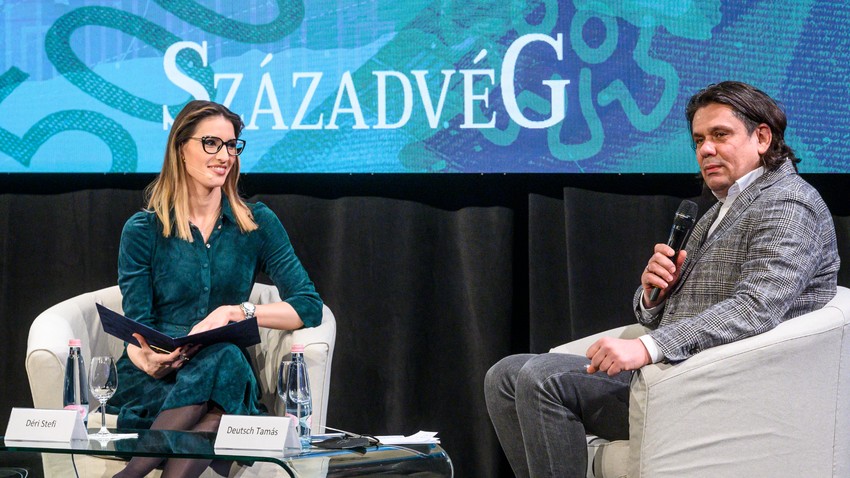According to Tamás Deutsch, there is complete personal and political idiocy behind the double standard, which, by the way, stems from the European imperial aspiration to subdue everything.
Fidesz member of the European Parliament (EP) Tamás Deutsch called the double standard in the European Union (EU) an existing and unfortunately currently insurmountable phenomenon at an event in Budapest on Monday.
At the Századvég Public Knowledge Center Foundation's conference entitled The age of crises - The results of the Europe Project research in 2021, the politician stated that there is complete personal and political idiocy behind the double standard.
Tamás Deutsch mentioned as an example of double standards that some people argue in favor of migration: life is the most important thing, people cannot die in the Mediterranean Sea. The same opinion makers, however, think quite differently about abortion: there is still a more important aspect than life.
The MEP believed that the upward phase of European cooperation ended with the Maastricht Treaty. National sovereignty is important to the majority of European people, he emphasized.
According to his words, the double standard stems from the European imperial desire to subdue everything.
The last two or three years of membership in the European People's Party have been terrible, Tamás Deutsch declared. He put it this way: it was bad to see how the imperial aspiration breaks up the pan-European consolidation, how it turns the large community into a grouping that can only be called good-naturedly mediocre. He said that west of Ljubljana there is no longer a serious populist force.
The EP representative emphasized that the motto of the EU is "unity in diversity". The whole cooperation started from diversity, without respecting it, it is not possible to talk about Europe's wealth of values, he opined.
Tamás Deutsch also spoke about the fact that, based on the Hungarian recovery plan, 2,500 billion forints will go to Hungary to mitigate the damage caused by the coronavirus epidemic. The European Commission has no authority to influence the disbursement of the amount, he said. What Brussels is "playing" with Hungary and Poland is "net blackmail," he said, citing the Hungarian child protection law as the reason.
Gábor Fűresz , the president of the Századvég Public Knowledge Center Foundation, stated that Hungarians are not members of an unorthodox minority in Europe. Hungarian public opinion actually belongs to the mainstream on many issues. The minority position is actually represented by the political elite in Europe, he said.
He announced that the Europe Project research was started in 2016, after the migration crisis broke out. The series of surveys included all important questions that concerned Europe. This year's data show that Hungarian public opinion is not alone in Europe - emphasized Gábor Fűrész.
Three-quarters of the members of European nation-states define themselves primarily as part of their nation rather than as European. There is not a single EU member state where the majority of citizens consider national identity secondary to European identity, the foundation president pointed out. However, some people have been saying to the Hungarian government for the past ten years that national identity is not inevitable, that European identity will take its place, and that a post-national era is beginning.
For a long time, Hungary has taken the position that Brussels needs to be reformed. In all of the European countries, there are a majority of those who imagine their future in the EU, so this is not a question. However, around three-quarters of EU residents would like changes in the operation and reduce the bureaucracy, said Gábor Fűrész.
In the past ten or twelve years, the issue of the democracy deficit has only arisen in relation to nation states. However, according to three-quarters of the European public, the EU leaders should be held accountable, and the map of the continent is uniform in this regard as well, he said. He added: Europeans want the operation of the union to be simpler and more transparent.
The majority of people would either maintain the current level of European integration or allow more sovereignty to nation states.
Family policy has also been a prominent aspect of Hungary in the last ten or twelve years. According to some, this already belongs to the past, the problems should be solved with immigration, he said. However, according to the research, the European public opinion is close to the Hungarian one. Even the majority of residents of Sweden, which defines itself as extremely liberal, believe that migration is not the solution to population decline, explained the foundation's president.
Gábor Fűresz emphasized that according to the majority of Europeans, the Jewish-Christian cultural heritage must be preserved.
The president of the foundation assessed that, if we do not look at the elite, the Hungarian position belongs to the rule, not to the exception.
MTI
Photo: MTI/Zsolt Szigetváry













